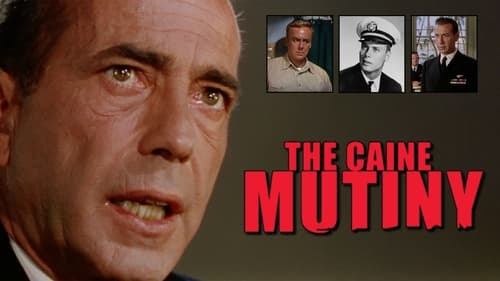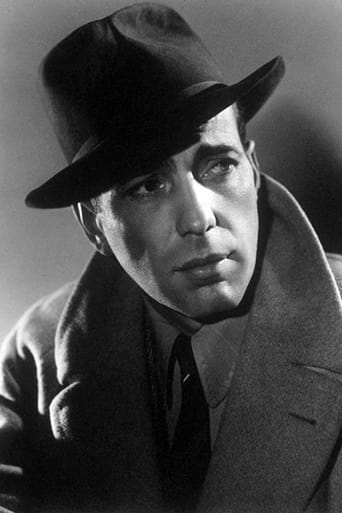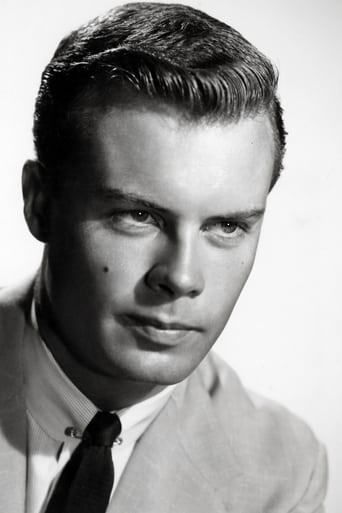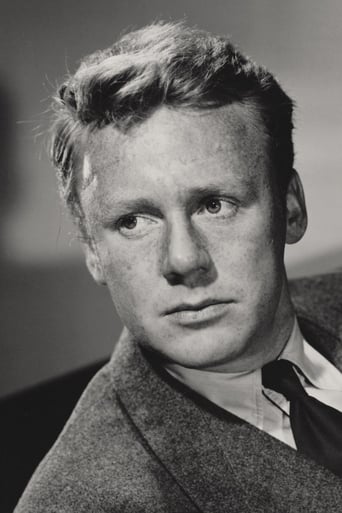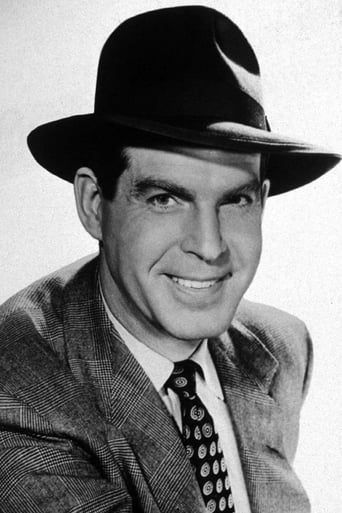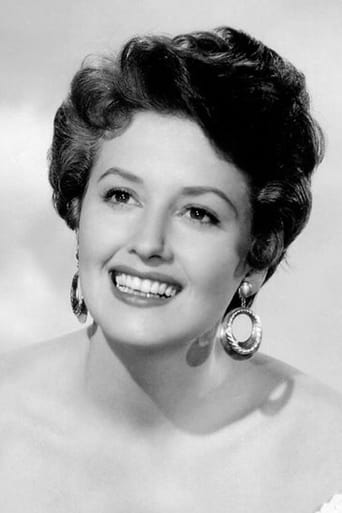cinemajesty
At a time, when television took place to invade private homes, Columbia Pictures presented a star vehicle with Humphrey Bogart as hopelessly overwhelmed substitute captain of the mine sweeping navy ship, called "Caine", which will grant him another academy award nomination for an actor in a leading role.At mark 25mins 35sec Bogart introduces the character of Queeg on the ship's deck, already getting hold into spiritual stranglehold of former captain, played by Tom Tully who desperately remarks before leaving ship "Keep the clock running thirty minutes slow to remember of the foul of the crew of the Caine." Screenwriter Stanley Roberts does everything in his power to bring the uncanny feeling of doomed ship's enterprise to the page. Trust has been given by producer Stanley Kramer, at that time still working for his first directing credit, so he passed the directing job to Edward Dymtryk, who has been overstepped by the Academy for a nomination as best director in 1955, which came at no surprise due to the lack of a personal signature towards the picture.The director utilizes craft-fully the given techniques from stunning technicolor imagery paired with restored documentary footage of maneuvering battleships in the Pacific ocean. Clearly helped out by his production designer Rudolph Stenard, creating a color-force out of sandstone, green and blue, and not to forget score composer Max Steiner who elevated the atmosphere of the picture. It has been a promising start for the director, when pitch-perfect beats strike at a training-concluding U.S. Marine ceremony when actor Robert Francis gives inaudible gestures to his fiancée, "I'll see you in ten." At this point, the director's eye approves and he keeps on directing safely in static beautifully balanced color shots and a POV of the movie's youngest character, who boards the Caine at running time mark 07mins 15sec by seeing mother of at the peer and neglecting the fiancée. Character Keith runs promptly into Lt. Tom Keefer, played by magnificent Fred MacMurray, who brings the ship's business down to a punchline,"A ship designed by geniuses, run by idiots." Me in the audience is getting prepared for a pace-holding classic, live-action shots of Navy destroyers crossing the Pacific, but the crew shows their quality completing their first drill with a goof ball procedure. The officers have time to write novels in the mean-time, so the Captain DeVriess gladly gives the command to Bogart's character Cpt. Queeg, who strikes back with fragility to motivate his crew, "There is the right way, the wrong, the Navy way and my way." Editor, Henry Batista, does the job with at times surprising EWS (extreme wide) and MFS (medium-full) shot inter-cutting, but Minutes later gets sloppy straight-angled medium-full and to medium-close-up shots in order to bring the picture of its requested 2-hour deliverable.At of the ACT I provides the audience's eye a relief at a country side, referring to a nowadays vanished life of the U.S. Western Coast in the 1950s, where arguably the strongest moments in "The Caine Mutiny" take place due to a connecting Director-Producer symbiosis and raising production value with interweaving shots of a full-bloom country side, a falling fire from a rock-side building the contrast as Earth & Fire towards the concluding storm scene, where the name-given mutiny takes place in the element Air & Water.Tensions by a performing ensemble cast can be hold to the point of mutiny, even with another playful anecdote on the Cpt. Queeg commanding abilities, when at a officers' briefing, Lt. Keefer coughs into the captain's speech, "Sorry captain that smoke went down the wrong way", followed by an honest close-up of Humphrey Bogart, bringing the fading captain to life. The continuing failing battle assignments somehow, recalls a recent battleship extravaganza from 2012er directed by Peter Berg, which makes me want to watch that movie again, strangely enough due to the 58-year-old Hollywood lifespan in between.Director Dymtryk clearly gets his captain's bug, when towards the end of ACT II, in middle of setting up the mutiny scene, sloppy matte paint and back projection work spoils the picture before presenting another strong scene on the Caine's bridge in the middle of a high sea storm, where Bogart's character gets entangled by their fellow officers. He starts to misjudge the ship's situation. Dutch angle take place for a derailed character, which pushes reminisces to Gregg Toland's Cinematography in "The Third Man", when the show is all over at 1hour 21mins 00sec.ACT III revives the love story between character Keith and his fiancée May with infantile approaches. Supporting actor Jose Ferrer gets brought in as internal affair lawyer faking his right hand injury, who's name is still used to market the movie. His performance limbs back on the expectations. The director loses grip. The pace of the film runs low and overall suspension gets loss. Missing clearly an Hitchcockean factor at the court room sequence.Humphrey Bogart does not stroke a home-run with his performance, but brings his final moments in the court room professional to the finish line referring to an overall statement, "that a captain of any ship must be perfect.". Sealed close-ups, crossed legs, camera pushing in on tighter to a rare extreme-close-up on Bogart's face revealing hints of a green iris in his eyes and sweating lips, covering his breath work professionally and concludes the show as another movie under his rooster.© 2017 Felix Alexander Dausend
mhubbard-54657
Yes it seems dated on the one hand. I agree with other reviewers that the romance is contrived and adds nothing at all to the story. On the other hand, watching Captain Queeg slowly lose his mind and the increasingly stressed crew try to deal with it- very interesting. Building to a climax where a hurricane threatens the ship. Queeg is paralyzed with fear and cannot take appropriate action. The junior officer must relieve him of his command in one of cinema's most dramatic moments. From there, the movie does tend to drag a bit, with the ensuing court martial.The ending makes little sense, where the defense lawyer apparently feels so guilty and horrible after winning the case that he has to get stinking drunk. Good film overall for students of psychology or history.
Hitchcoc
The beauty of this film is that there is no black and white. Bogart's Queeg should have been relieved of duty before because of his unpredictable emotions. He is mostly correct about the ship. They have been fortunate to function well under a liaises faire commander. Queeg is blood and guts and tries to push his agenda on the crew. They are not great sailors because they begin to undermine his authority, yet are self righteous about their motives. The incident with the strawberries is nutty enough; Queeg on the verge of a nervous breakdown. But, of course, command decisions later are the real reason for the mutiny. The men know they must do something and mutiny followed by a trial occurs. When the chips are down, MacMurray gets going. He is the wise guy who embraced the mutiny until the trial began to go badly. Queeg is pathetic at this point, but his service record is worthy of respect. Great movie.




